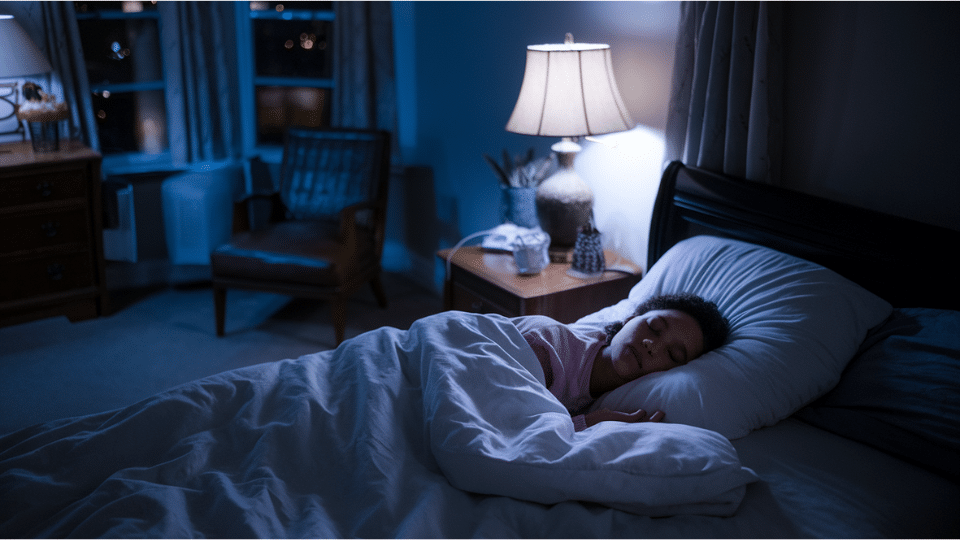Have you ever been kept awake by your own snoring or noticed it becoming a nightly issue? While snoring is often seen as a problem for men, many women experience it too.
The causes of snoring in women can be varied, and for some, it’s more than just an occasional nuisance; it disrupts sleep and affects their quality of life.
If you’ve noticed yourself or someone else snoring at night, you might be thinking why it’s happening and if it’s something to worry about.
I’ll help you understand the causes of snoring in women and what steps you can take to address it. Keep reading to find out how you can improve your sleep and stop snoring for good.
Understanding Snoring: What It Is and How It Starts
Snoring happens when air can’t move freely through your nose and throat while you sleep. As you breathe, the airflow causes the relaxed tissues in your throat to vibrate loudly.
These vibrations create the harsh sound we all recognize as snoring during the night. Both men and women snore, though it’s often discussed as a male-only problem.
Women can face unique factors that contribute to snoring at different stages of life. Your tongue, soft palate, and throat muscles all contribute to snoring.
The intensity can vary from light breathing noises to extremely loud disruptions throughout the night. Sometimes snoring is harmless, but it can also signal more serious breathing problems.
Causes of Snoring in Women

I’ve found that snoring in women stems from various factors like hormones, weight, and sleep habits. Here are the main causes you should know about when considering what causes snoring in females:
1. Hormonal Changes
Hormonal fluctuations during pregnancy, menopause, or thyroid problems can relax your throat muscles significantly. When these muscles relax too much, they partially block your airway during sleep.
This blockage causes the tissues to vibrate and create snoring sounds throughout the night. Estrogen and progesterone help keep throat muscles firm, so changes in these hormones matter. Women going through menopause often notice snoring starting for the first time.
2. Obesity or Weight Gain
Excess weight, especially around your neck and throat area, can narrow your airway noticeably. The extra tissue puts pressure on your breathing passages when you lie down to sleep.
This makes it harder for air to flow smoothly, which leads to snoring problems. Post-menopausal women are particularly vulnerable because weight tends to redistribute around the neck then. Losing weight often reduces or eliminates snoring completely.
3. Nasal Congestion and Allergies
Conditions like sinus congestion, seasonal allergies, or nasal polyps can completely block airflow through your nose. When you can’t breathe through your nose, you’re forced to breathe through your mouth.
Mouth breathing increases the chance of snoring because air flows differently through your throat. Chronic allergy congestion worsens this problem over time. Treating your allergies or congestion often helps reduce snoring immediately.
4. Sleep Deprivation
Lack of quality sleep or not getting enough rest makes your throat muscles relax excessively. When you’re exhausted, your muscles don’t maintain their normal tone during sleep.
This extra relaxation increases the risk of airway blockage and snoring sounds throughout the night. Women who are sleep-deprived often snore more than when they’re well-rested. Getting consistent, quality sleep helps muscles maintain better tone naturally.
5. Age and Muscle Tone
As women age, the muscle tone in their throats naturally decreases over the years. After menopause, declining estrogen and progesterone levels make this muscle loss even more pronounced.
Weaker throat muscles are more likely to collapse and vibrate during sleep, creating snoring. This is why many women start snoring for the first time in their fifties. Throat exercises and staying active can help maintain better muscle tone.
6. Sleep Position
Sleeping on your back allows gravity to pull your tongue backward toward your throat. This position can partially block your airway and cause the tissues to vibrate loudly.
Women who sleep on their backs are much more likely to snore than side sleepers. Changing to a side sleeping position often reduces or stops snoring completely for many people. Back sleeping is one of the easiest snoring triggers to fix.
7. Medications and Sedatives
Certain medications, like sedatives, muscle relaxants, or antidepressants, can relax your throat muscles excessively. When these muscles become too relaxed during sleep, they’re more likely to collapse partially.
This collapse blocks your airway and causes vibrations that create snoring sounds at night. If you notice snoring starting after beginning a new medication, talk to your doctor immediately.
How Snoring Affects Women’s Health?
Snoring isn’t just annoying; it can seriously harm your health if left untreated for a long time. Chronic snoring disrupts your sleep quality, leaving you exhausted and drowsy throughout the entire day.
This constant fatigue affects your ability to focus, work effectively, and enjoy daily activities properly. Snoring also puts extra stress on your heart and blood vessels over time.
Women who snore regularly face higher risks of developing high blood pressure and experiencing strokes. The lack of quality sleep from snoring can trigger or worsen mental health problems.
Many women with chronic snoring develop anxiety and depression from constant exhaustion. Your overall quality of life suffers greatly.
Treatment and Remedies for Snoring in Women

Treating snoring requires a combination of lifestyle changes, sleep adjustments, and sometimes medical interventions. Here’s what I’ve found to be the most effective approaches to reduce or eliminate snoring:
1. Lifestyle Changes
Simple lifestyle modifications can make a huge difference in reducing snoring over time. Here are the key changes that help most women:
- Losing weight through regular exercise and healthy eating improves muscle tone and reduces airway pressure.
- Avoiding alcohol before bedtime prevents the throat muscles from relaxing too much during sleep.
- Quitting smoking reduces throat inflammation and swelling that contribute to airway blockage.
These changes take time but often produce lasting results for many women. Your body responds well to healthy habits that support better breathing at night.
2. Sleep Position Adjustments
Changing how you sleep is one of the simplest ways to reduce snoring immediately. Here’s what works best for side sleeping:
- Sleep on your side instead of your back to keep your tongue from falling backward.
- Use a body pillow between your knees to make side sleeping more comfortable all night.
- Try special positioning devices or tennis balls sewn into pajamas to prevent rolling onto your back.
Side sleeping feels awkward at first, but becomes natural with practice and consistency. Most women notice less snoring within just a few nights of this change.
3. CPAP and Other Devices
Medical devices can help keep your airway open throughout the night for better breathing. Here are the main options available:
- CPAP machines deliver continuous air pressure through a mask to prevent airway collapse during sleep.
- Oral appliances reposition your jaw forward to keep your throat open while you sleep comfortably.
- Nasal strips or dilators open the nasal passages to improve airflow and reduce mouth breathing.
These devices require adjustment periods, but work well once you get used to them. Talk to your doctor about which option fits your specific snoring type best.
4. Medical Interventions
Surgery becomes necessary when other treatments fail or physical blockages exist in your airway. Here are common surgical options for women:
- Nasal surgery corrects deviated septums or removes polyps that block airflow through your nose.
- Septoplasty straightens the wall between your nostrils to improve breathing and significantly reduce snoring.
- UPPP surgery removes excess tissue from your throat to widen the airway permanently.
Surgery carries risks and requires recovery time, so it’s typically a last resort option. Your doctor will evaluate whether your snoring severity justifies surgical intervention.
Preventive Measures to Minimize Snoring Before It Starts
Preventing snoring before it starts is easier than you might think. Simple lifestyle changes and habits can make a big difference. Here are some preventive measures to consider:
- Maintain a Healthy Weight: Excess weight around the neck can narrow the airway and worsen snoring. Staying active can help.
- Avoid Alcohol and Sedatives: Alcohol and sedatives relax the throat muscles, making snoring more likely. It’s best to avoid them before bed
- Establish a Regular Sleep Routine: Going to bed and waking up at the same time each day can help improve sleep quality and reduce snoring.
- Stay Hydrated: Drinking plenty of water helps keep the tissues in your throat moist and reduces the chance of snoring.
By adopting these habits, you can reduce the chances of snoring and improve your sleep quality.
Summing Up
Understanding the causes of snoring in women is the first step toward finding a solution. If it’s a result of habits, lifestyle choices, or other factors, there are ways to reduce or eliminate snoring.
I’ve found that simple lifestyle changes, adjusting your sleep position, and using medical devices can make a big difference. If snoring continues or starts to interfere with your daily life, it’s important to talk to a doctor.
Addressing the root causes of snoring in women will not only help you sleep better but also improve your overall health and well-being.
If you have any questions or want to share your thoughts, feel free to leave a comment below!









